International Youth Day: inspiring young minds with Snehal Kadam
Posted on August 11, 2023 by Microbiology Society
International Youth Day takes place annually on 12 August to highlight the challenges for youth across the globe. This year’s theme is all about providing young people with green skills to help create a sustainable world. One way this can be achieved is by teaching young people about science and microbiology, more specifically. One member who has done just that, is Snehal Kadam, a PhD student at Hull York Medical School, University of Hull, UK. Snehal was awarded with an Education and Outreach Grant from the Society and used it to set up a programme of events called Microbe Express for Kids. Read Snehal’s blog to find out more about this fascinating project.
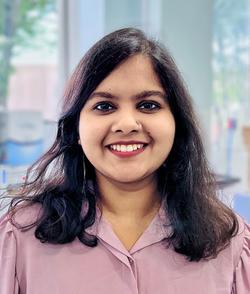
Talk To A Scientist (TTAS) is an online science outreach platform for children aged 6–16 years, co-founded by Dr Karishma S. Kaushik (IndiaBioscience, India) and I. We showcase science and scientists to children in an interactive, engaging format to build curiosity and appreciation for science, as well as building informed future citizens, leaders and decision-makers. You can find out more on our website.
In our latest season, Microbe Express for Kids, funded by the Microbiology Society, we curated a specially-designed series to introduce young minds to the diverse microbial world. Throughout the season, we utilised emojis and simple expressions that young people could relate to, introducing new topics with each episode. For instance, one of our sessions on ‘Microbes and Food’ was playfully named ‘Yummy😋’.
Our primary goal was to highlight the crucial role of microbes in human life through a range of engaging topics. From exploring social communities of microbes to understanding their presence in food, bioremediation and infections; we aimed to instill a lifelong curiosity and appreciation for microbiology in young minds. With guest scientists from India, the UK, the USA, and Chile, we structured the season to discuss microbes in poop, microbes and infections, microbes in Antarctica and even provided a virtual tour of a microbiology laboratory, among other fascinating subjects. By showcasing microbiologists and their work, our intention was to nurture contemporary scientists as modern-day role models, helping children identify with microbiology and science as a profession.
In addition to our live webinar sessions, we also shared fun activities based on the session content. This allowed children to apply what they had learned during the sessions, making the learning experience even more interactive and enriching.
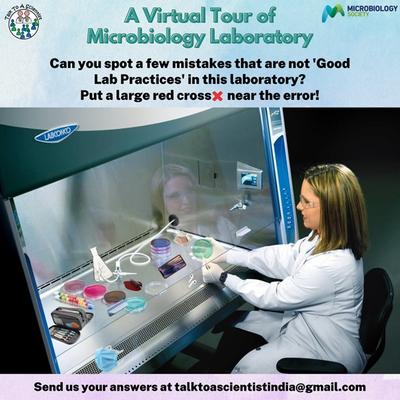
Weekly activity released following the Microbe Express episode, taking participants on a Virtual Tour of a Microbiology Lab.
Our webinars received an overwhelming level of engagement, with participants asking insightful questions. For example, during our session on antimicrobial resistance with Dr Blessing Anonye (Manchester, UK), a young participant asked whether it was possible to target only bad bacteria without affecting good bacteria. This demonstrated their understanding of the importance of good bacteria from previous sessions and why the use of antibiotics might lead to the loss of these beneficial microbes. Another session, with Dr Sophie Darch (University of South Florida, USA), where we discussed how scientists visualise microbes, prompted a young person to ask how the shape of bacteria affects their functionality. During our virtual tour of a microbiology lab with Nizam Shaikh (Savitribai Phule Pune University, India) a young participant inquired about the reason for changing pipette tips when inoculating different tubes. These questions were a testament to the season’s success, not only in imparting new information, but also sparking curiosity and encouraging young minds to ask more questions. Throughout the season, our guest speakers collaborated with us to create outstanding pieces of science engagement, helping us to achieve our goals.
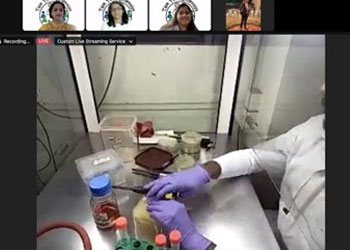
Guest speaker, Nizam Shaikh, demonstrating how scientists pour media and inoculate the media with bacteria in a biosafety hood during the live session.
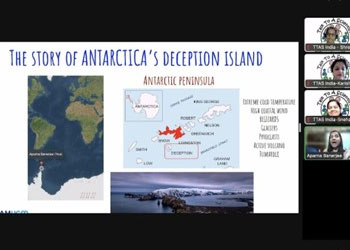
Guest speaker, Dr Aparna Banerjee (Universidad Autónoma de Chile, Chile), talking to participants about Deception Island in Antarctica and microbes in extreme environments.
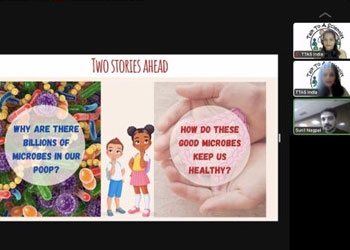
Guest speaker Sunil Nagpal (Tata Consultancy Services, India) talking to participants about ‘Microbes in our Poop’, the gut microbiome and the role good microbes play in keeping us healthy.
To gauge the impact of our sessions, we asked young people to complete a short survey before and after each session. The survey involved selecting an emoji and associated expression that came to their minds when thinking about the topic of that session. Upon analysing the pre- and post-session information, we noticed a shift in certain perceptions young people had about microbes. For instance, before the Microbes and Food session, some participants felt ‘😕 Confused,’ ‘😨 Scared,’ or ‘😟 Worried’. After learning about microbes that help plants grow and make our food delicious, they expressed feeling ‘😲 Astonished’ and ‘🤯 Mind Blown’.
The joy we experienced, while engaging with children during the Microbe Express for Kids season, was beyond measure. Witnessing their eyes light up with wonder as they discovered the hidden world of microbes was truly heartwarming. Their insightful questions and enthusiasm throughout the sessions reminded us of why we started TTAS in the first place.
TTAS has been an immensely fulfilling journey for me. It has allowed us to connect with children from diverse backgrounds, share our passion for science and inspire the scientists, leaders and citizens of tomorrow. We are grateful to the Microbiology Society for their invaluable support in bringing the Microbe Express for Kids season to life.
For those eager to learn more about TTAS, follow our next season, access our freely available content or get in touch with us, visit our website!
If you have a microbiology outreach project you would like support with, find out more about the Society’s Education and Outreach Grants.
